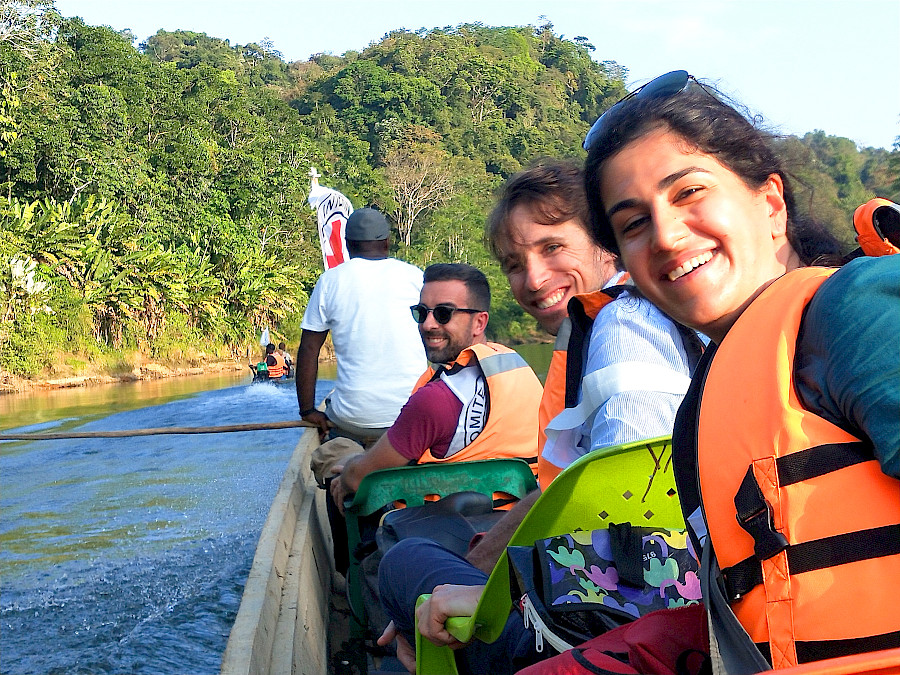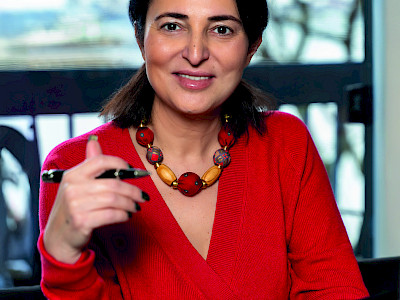
In this interview with NARGIS Magazine, Shahla Vazirova, Founder and President of the “Huma Quşu” Educational Support Fund, shares the history behind the fund, reflects on the past projects, and reveals future plans.
What inspired the creation of the “Huma Quşu” Educational Support Fund? What are its goals and priorities?
In March 2021, our family faced an unimaginable tragedy. We lost our daughter Humay Guliyeva in Colombia. At the time, she was working for the International Committee of the Red Cross as the group leader for the Protection of the Civilian Population in Medellín. Humay was an extraordinary young woman - curious, courageous, and compassionate adventurer. She had strong sense of justice, inclusive worldview and a tender love for her country.
She earned her bachelor’s degree at Bilkent University in Turkiye and went on to complete a master’s degree at Columbia University in the United States. In our family, Humay was the kindest, most tender, and deeply humane soul among us. It was no surprise that her values and nature led her to a life of service through the Red Cross. Fluent in six languages, she had an exceptional ability to navigate complex humanitarian challenges with grace, that won many hearts. She was a constant source of joy and optimism in our lives. Her loss brought with it a profound sorrow and left behind a void that can never be filled. But we knew - her journey couldn't end there. Such a bright spirit, such noble work, and such pure intentions deserved to live on.
Humay had a favorite saying: “In the end, everything will be fine. If it’s not fine yet, it’s not the end.” These words guided her, and now they guide us. In her memory, we decided to continue the work she believed in so passionately. That’s how the idea of establishing a charitable fund was born. As an initial donation, we used Humay’s salary, which she didn’t use much and was accumulated in her bank account. Inspired by her love of learning, books, and knowledge, we chose to focus the fund’s mission on education. Our goal is to support talented, hardworking young people from underprivileged backgrounds by giving them access to quality education both in Azerbaijan and abroad. Initially, we envisioned the fund as a way to support young women in particular. But as we reflected further, we realized that true to Humay’s values, we needed to embrace the principle of gender equality. Today, the fund serves all youth who meet our core criteria: financial need, intellectual ability, and a commitment to their studies.
What projects has the fund implemented so far? What are the results?
“Huma Quşu” Educational Support Fund has been operating for nearly three years now. In that time, we’ve launched nine distinct programs. Our very first initiative supported veterans of the Second Karabakh War by funding their IT education. We recognized the growing importance of digital skills in today’s world, and more importantly, we saw this as a pathway for young people who have returned from the frontlines, to rebuild their futures with purpose, dignity, and stability.
Another direction of our work has been our multi-level education support program for talented youth. For instance, Ranal Qurbanov, who has been studying medicine at Gazi University in Ankara with the Fund’s full support for the past three years, has already risen to the top ranks among Turkey’s medical students. Another grantee, Aziz Panah - a talented oboe performer- is currently pursuing a degree at the Robert Schumann University of Music in Germany. Still being a student, he was recently accepted into the orchestra of the Bavarian State Opera. Meanwhile, Ayan Aslanova, another bright scholar supported by our fund, is continuing her piano studies in Germany.
We also run a program that assists Azerbaijani youth pursuing master’s degrees at ADA University. One of our grantees, Bibikhanim Samadova, has been studying there for two years and plans to embark on an academic research career.
Building on this, in 2025 we launched a new initiative called “Humayın Təhsil ADA-sı” (Humay's Island of Knowledge). Through this program, three young women received scholarships of 5,000 AZN each to pursue their master’s degree at ADA. Two of these women are currently working as schoolteachers in rural communities.
We also continue our initiative called Small Grants, launched in 2023. It runs two cycles per year in spring and autumn, and awards 2,500 AZN to each selected applicant. While the amount might seem modest, it often makes a world of difference in helping students achieve specific goals. Today, this initiative has evolved into what we call “From Dream to Reality,” program and continues to attract a high number of applicants each cycle.
This year, with financial support from Azercell, we launched a new initiative: Humay's "Girls' Advancement in STEM" scholarship program. Initially, we planned to award five scholarships, but the sheer talent and brilliance of the applicants moved us deeply. We doubled the number of recipients, ultimately awarding grants of 2,500 AZN each to 10 young women. Both Azercell and the Fund contributed equally to the total fund of 25,000 AZN.
We also conduct mentorship programs. To help students navigate their educational and career journeys, we attract professionals who can offer guidance, motivation, and practical advice, which significantly enhanced the effectiveness of our work. Through social media, we issued an open call to experienced professionals interested in mentorship. So far, nearly 50 young people have received financial support from the Fund, and we aim to pair each of them with a dedicated mentor.
One of our most meaningful programs is Humay’s “Courage Grant.” It’s awarded to students who have demonstrated exceptional bravery in overcoming hardship in pursuit of education. The idea was inspired by Humay’s powerful TEDx talk delivered in Baku 11 years ago, titled “The Importance of Courage.” Just like her life, this grant honors bold steps, fearless choices, and a relentless pursuit of purpose.
Who typically applies for these scholarships and why?
As stated in Fund’s website, our doors are open to Azerbaijani citizens between the ages of 16 and 35. Naturally, strong academic performance is essential, but just as important is financial need. Applicants must come from households where the average monthly income per family member does not exceed 500 AZN. We receive applications from young people pursuing or planning to pursue bachelor’s, master’s, or PhD degrees. Their needs vary widely: some require assistance with tuition fees; others need help covering living expenses, purchasing a new computer, paying for courses or certification exams, or even submitting applications to universities abroad. For PhD students, support often goes toward attending academic conferences or covering the costs of publishing articles and theses. Take, for instance, Aisha Narimanova, a PhD candidate in history. Recently, she was invited to the United States to participate at the course on one of the ancient languages. The host institution covered the program costs, the Fund covered her visa fees and airfare.
Another example is the story of Qendab Mammadova, who won a scholarship to Harvard University. The university encourages students to gain work experience during their studies, but as a result, it provides $3,500 less than what students actually need, leaving them to cover the gap themselves. In her first year, Qendab found it difficult to juggle work with adjusting to life abroad. We provided the funds she needed, allowing her to focus fully on her studies and adapt to her new environment. She was awarded both a Small Grant and a Courage Grant. What makes Qendab’s story even more remarkable is that she is the first person in her family to pursue higher education.
What are the criteria in selecting scholarship recipients? Is demonstrating strong academic performance enough?
The selection process is thorough and multi-staged. It begins with the initial review of applications submitted to our official email address. If the documents meet all eligibility criteria, the candidates then move to the next stage, where we conduct detailed evaluation of their submissions sent through our website. This assessment is carried out by a dedicated group of six to seven experts who work purely as volunteers. From there, the top twelve scorers are invited for an interview, which is conducted online. The final decision is based on the interview results. Every candidate is asked the same set of questions - there are no “easy” or “difficult” paths. Each jury member independently assigns scores, and the overall rating is calculated by comparing and averaging these results.
What truly distinguishes our process, however, is that we don’t evaluate candidates solely on academic achievement. Of course, strong academic performance matters - but just as important, perhaps even more so, are the personal values of the applicants. That’s why our interviews are designed not just to test knowledge or motivation, but to uncover deeper qualities of applicants.
How do you choose project partners? How did you team up with Azercell?
Since the core mission of the Fund is focused on supporting education we prioritize collaboration with universities. Our very first event was held at ADA University, which marked both our launch and our first introduction to a wider audience. A year later, we returned to ADA to present our annual report called “The Achievements Up-to-Date.”
Over time, we hosted presentations at other leading universities in Azerbaijan, including Khazar University, the Azerbaijan State University of Economics, the Pedagogical University, and the Slavic University. The goal of these sessions was to inform students about our programs. These events were conducted in an interactive format, allowing students to engage directly with our team. As a result, we saw a significant increase in the number of applications to our programs.
We also held presentation events in Budapest and Vienna - two cities that held personal significance in Humay’s life. Moreover, both are home to large communities of Azerbaijani students. It was interesting for them to learn that such an organization exists back home in Baku.
Our partnership with Azercell began, interestingly, by chance. One day, I came across an announcement for their program titled “Empowering lives: women’s support program.” It immediately caught our attention, as it focused on promoting women in science, technology, engineering, and mathematics (STEM) - a field where we knew many talented young women were excelling. We reached out to Azercell and proposed a collaboration and thankfully, our project was selected.
What is the purpose of the "Girls' Advancement in STEM" program, and why is women’s participation in STEM so important?
Humay’s “Girls' Advancement in STEM” program aims to encourage young women to pursue careers in mathematics, science, and information technology—fields that are still, unfortunately, male-dominated in Azerbaijan. Historically, boys have held a stronger presence in the IT sector here. But we believe it’s time to change that. We launched this project precisely because we recognize the intellectual strength and analytical abilities of our young women. In an era defined by rapid technological advancement, gender equality must be upheld.
That said, we also recognize a growing awareness that the future won’t rely solely on technical skills. Increasingly, people are emphasizing the value of human-centric qualities. Talents in music, literature, and the arts will become even more important.
What can you tell us about the scholarship recipients? How promising are the initial results?
Because our scholarships are awarded through a collegial decision-making process, it’s nearly impossible for someone to be selected by chance or favoritism. While one person might be misled, it’s far more difficult to sway an entire panel of six to seven experts. Many of them were Humay’s close friends, colleagues, and confidantes. They knew her well and doing this work pro bono.
In short, we strive to identify the very best among the best, and I believe we succeed it most of the time. Our scholarship recipients are not just top students in their chosen disciplines. They are intellectually curious, globally aware, and grounded in strong ethical principles. They’re able to think critically, express their views confidently, and stand by their convictions. What’s more, they are deeply patriotic and see their future as inseparable from the future of Azerbaijan. So yes, I can say with full confidence: they truly live up to the ideals we set out to support.
What are the fund’s plans for the near future?
In September, we plan a presentation for “Huma Quşu” Educational Support Fund at Azerbaijan Medical University. On November 1, we will announce the autumn call for the “From Dream to Reality” competition. On November 16, on the eve of Humay’s birthday, we will host a charity gala at the Opera Studio of the Baku Music Academy, hosting renowned Azerbaijani artists.
Last year, we hosted a similar event at the International Mugham Center, featuring the renowned jazz musician Salman Gambarov and his group Bakustic Jazz. I’d like to emphasize that our artists participate in these events without any expectation of compensation. Their generosity and commitment to the cause make a meaningful contribution to the development of education. While expressing my deepest gratitude to them, I would also like to take this opportunity to warmly invite you and the many readers of Nargis magazine to our upcoming Charity Gala, which will take place on November 16. We would be honored to have you with us.



